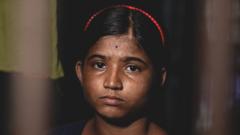In the Indian state of West Bengal, childhood innocence is tragically overshadowed by the violence of homemade bombs, often linked to political strife. A BBC Eye investigation has revealed that in the last thirty years, at least 565 children have suffered injuries or fatalities due to these devastating explosives, enduring a grim fate as pawns in a turbulent political landscape.
One heart-wrenching account comes from the summer of 1996, when nine-year-old Puchu Sardar and his friends unknowingly stumbled upon explosives disguised as playthings while playing cricket. The sudden blast not only took the lives of his friends but left Puchu himself with enduring injuries. In moments like these, an ordinary day transformed into a life-altering nightmare.
The investigation, sourcing from local newspapers, meticulously documented at least 94 fatalities and 471 injuries, suggesting a child falls victim to bomb violence, on average, every 18 days. Most occasions occur outdoors, where children encounter these accidental calamities, often amidst political tensions, particularly during elections when these weapons are frequently deployed to instill fear among political opponents.
West Bengal has a complex history of political turmoil, with various rulers and ideologies contributing to an environment ripe for violence. The use of bombs as tools for intimidation has persisted through decades of conflict, with roots tracing back to the fight against British rule in the early 20th century. Unfortunately, the current generation bears the brunt of this violent legacy, with young victims bearing physical and emotional scars.
Among the survivors is Poulami Halder, who at age seven, found what she thought was a ball but turned out to be a bomb, ultimately resulting in the amputation of her left hand. Similarly, Sabina Khatun's life changed forever when curiosity led her to a bomb, causing immense personal struggle. Despite these hardships, both girls show resilience, adapting to their new realities while aspiring to become teachers.
Despite the documented tragedy, political parties in West Bengal are in denial regarding their involvement in promoting such violence. While they publicly condemn the bombing incidents, experts contend that the culture of political violence is deeply ingrained and systemic. The unyielding cycle raises questions about societal responsibility and political accountability, echoing calls for an end to the ongoing violence that continues to harm the most vulnerable.
As the region prepares for elections, families remain in distress, hoping for safety and a change to a cycle of violence that deeply impacts their children. Regrettably, tragic incidents persist, underscoring the urgent need for action. Children like Puchu, Poulami, and Sabina remind us that the specter of violence must be addressed, ensuring a safe future for all, especially the most innocent victims of political strife.





















